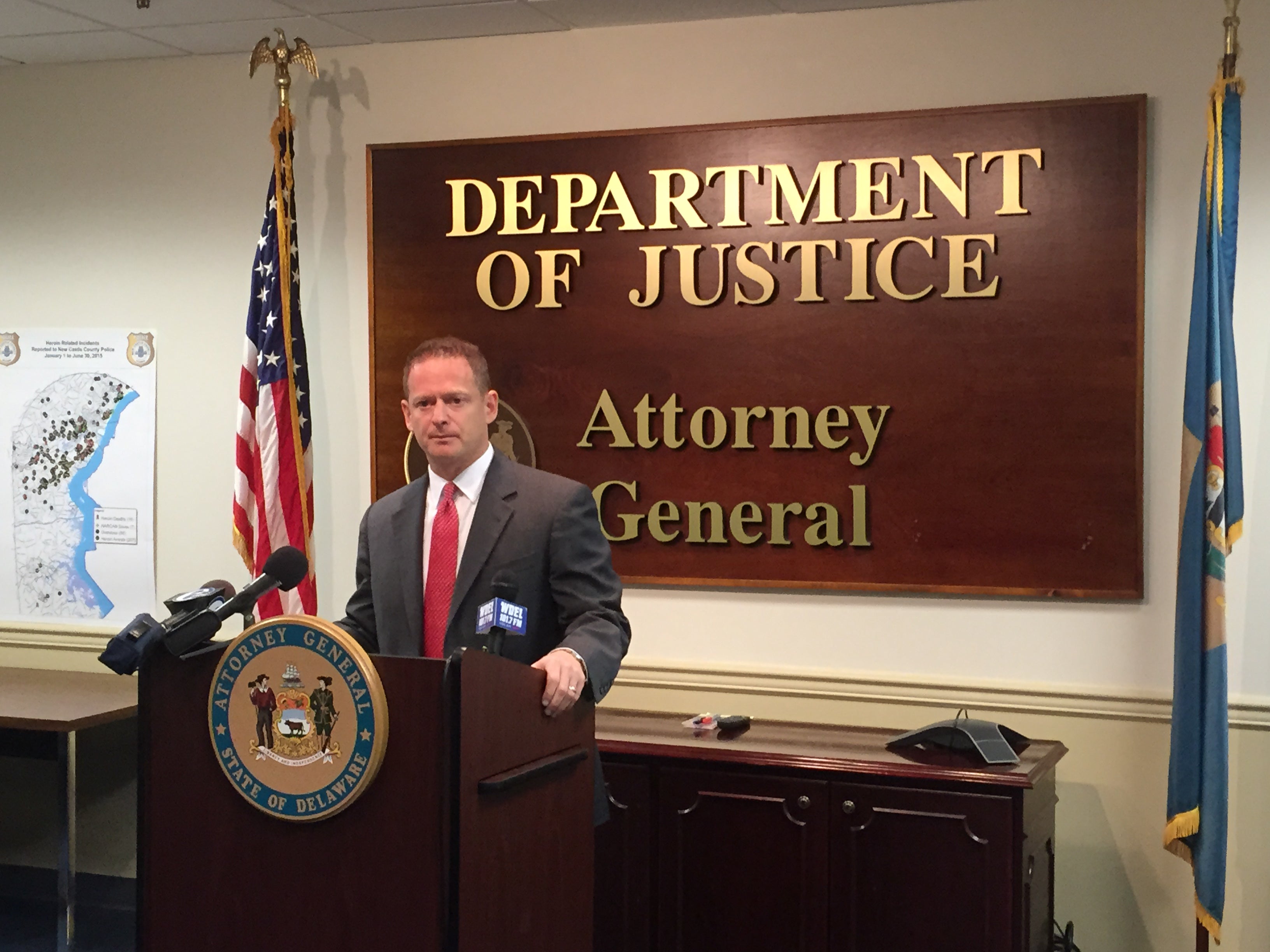Delaware takes additional steps to fight heroin epidemic

Attorney General Matt Denn announced a four-part plan Thursday to attack heroin addiction in Delaware.
Attorney General Matt Denn, health officials, law enforcement and recovery advocate group Attack Addiction announced a four-part plan to fight heroin addiction.
In 2014, Delaware had 185 total suspected drug overdose deaths—that’s the equivalent of one death about every other day. Overdose deaths were more common than traffic deaths that year.
Between 2008 and 2013 heroin and opioid pain reliever overdoses increased from 124 to 160, and tripled between 2009 and 2013.
In 2013, Delaware had the ninth highest drug overdose rate, and the fifth highest drug sales per capita.
Heroin use is being called “Delaware’s epidemic” by law enforcement and professionals in the healthcare community.
Thursday, Attorney General Matt Denn, New Castle County Police, families of overdose victims and health experts are calling for stronger initiatives to tackle the heroin problem in the state. They outlined a 4 part plan to fight addiction.
“Far too many Delawareans are dying from prescription drug and heroin overdoses,” Denn said during the press conference.
“The catalysts behind many of the state’s efforts in the last several years to deal with substance use disorder have been the family members of Delawareans who suffered from drug overdoses—some of whom did not survive. We owe it to them, and other families who have lost loved ones, to redouble our efforts.”
The plan calls for legislation to require an independent review of all drug related deaths, continued advocacy for treatment centers, the expanding use of naloxone, a drug that revives overdose victims, and tighter regulations on prescription opiates.
The goal is to have a multidisciplinary approach to heroin addiction, so all involved parties, such as educators, health professionals and law enforcement, are taking part in the effort.
In 2010, Delaware created its first computerized prescription drug monitoring program, and was refined by statute in 2013. The state also has made investments in new treatment beds for individuals struggling with addiction.
However, health professionals say more needs to be done to tackle an addition problem that is getting out of control.
“Sadly we are fighting a disease of epidemic proportion, and this disease is destroying, and is taking lives,” said Rita Landgraf, Delaware’s secretary of health. “We know that treatment works and that recovery is possible.”
The Board of Medical Licensure and Discipline enacted a regulation in 2011 that outlined specific rules that all doctors are required to follow when treating chronic pain. However, health experts say the regulations exempt the treatment of acute pain.
Delaware’s Controlled Substance Advisory Committee is creating a separate set of prescription standards and a procedure for ensuring careful practices in the prescription of opiate drugs.
The Committee is asking that the State’s prescription monitoring program obtain a patient’s prescription history prior to prescribing new drugs, and also is asking that doctors obtain a personal history from the patient.
For chronic pain treatment the Committee is asking for a more careful analysis by physicians, including a physical examination and a urine drug screening. A urine drug screening also should take place every six months during the course of an opioid prescription, the Committee states.
According to the Center for Disease Control and Prevention, an individual is 19 times more likely to use heroin if they are dependent on prescription drugs, and 80 percent of heroin users have abused opiate prescriptions.
“When doctors prescribe opiates as pain medication, it’s like giving patients a loaded gun that must be handled properly so that death by the disease of addiction does not occur,” said Don Keister of Attack Addiction, who lost his 25-year-old son to a heroin overdose.
Several years ago, some medical professionals were simply prescribing prescriptions rather than treating their patients, Landgraf said. So the state cracked down on those doctors, and heroin sales increased on the streets because individuals could no longer get opiate prescriptions from these “pain mills,” she said.
“We have very good doctors that will do the right thing, but I think we need to look at how can we regulate those “bad actors” form entering in and damaging humans,” Landgraf said.
The plan to attack heroin addiction also includes a call for the drafting of legislation that would require deaths from opioid overdose to be subject to formal review in order to get a better understanding of the causes of prescription opioid and heroin overdose deaths and to take remedial steps when appropriate.
“What we have found is it tells us more about our systems of care, it tells us more about what’s happening so death doesn’t go unnoticed,” Landgraf said.
“We know with this disease relapse is possible and really probable. If we better understand the gaps in care along the way we can prepare for that and fix those gaps so we don’t lose people.”
The plan also requests increased treatment opportunities in the state, as well as the responsible use of medically assisted treatment, such as methadone, which helps an opiate addict overcome addiction.
A group also will be organized with the goal of making these treatment programs more accessible to Delawareans.
Landgraf said treatments like methadone can help a patient successfully overcome opiate addiction if enacted properly.
“It needs to be used in a way that it’s part of the treatment with the idea that people can possibly be weaned off and be better introduced to coping methods.”
Narcan use is part of the plan
The plan also calls for increased first responder access to naloxone, a drug that reverses the effects of an overdose.
Narcan, a brand of naloxone, was introduced to New Castle County Police at the end of April as part of a pilot program with 38 officers trained and equipped to use it.
It’s the second unit to receive Narcan—Ocean View Police Department received it several months ago. Since its introduction in New Castle County, there have been seven uses by police officers that have saved lives.
High school nurses also will start carrying naloxone in the fall. In 2014, the youngest overdose victim was 15 years old.
Paramedics in Delaware have been using naloxone since 2013, but it wasn’t until August that Gov. Jack Markell passed a bill sponsored by Sen. Bethany Hall-Long, D-Middletown, that permits officers to carry it.
“None of my officers want to be standing in the doorway when a family member or child walks up from the sidewalk, looking into their eyes, knowing that the next thing you’re going to tell them will impact them for the rest of their lives,” said Fred Calhoun, Delaware fraternal order of police president.
“We believe this program will give individuals a second chance, a new life and reconnect them with their family.”
WHYY is your source for fact-based, in-depth journalism and information. As a nonprofit organization, we rely on financial support from readers like you. Please give today.





